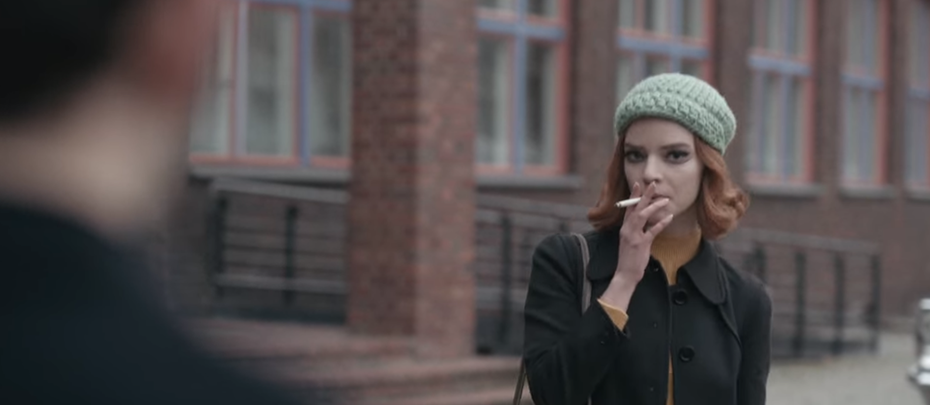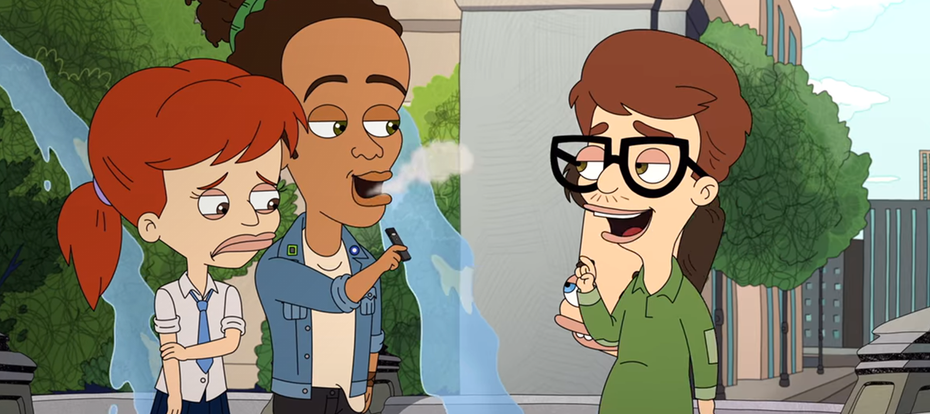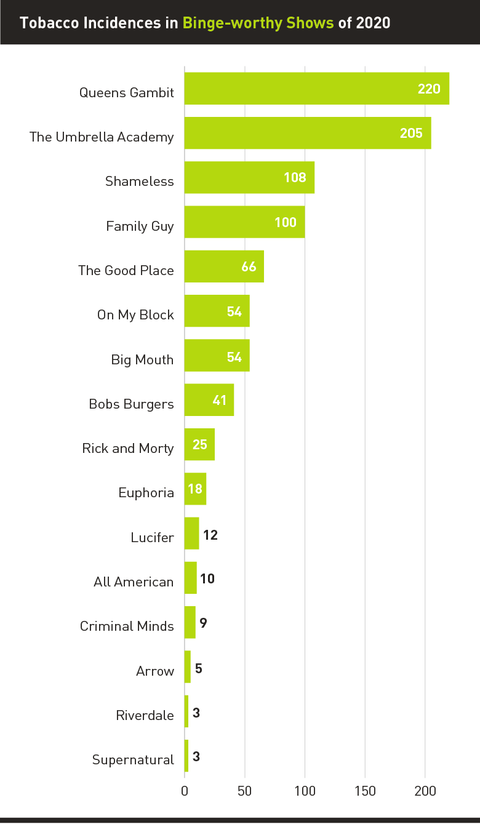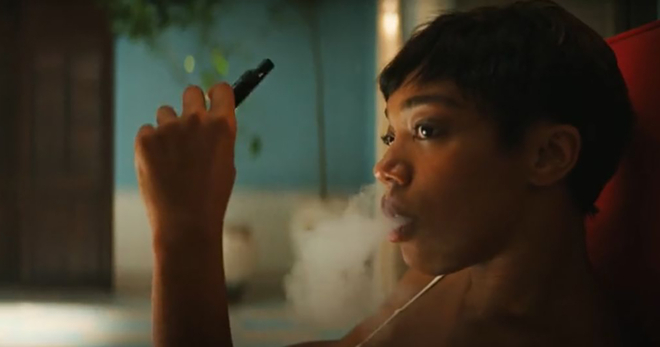Nicotine on demand
Tobacco remains rampant in the year’s most popular shows, movies, and music videos, fueling the ongoing youth e-cigarette epidemic
EXECUTIVE SUMMARY
Truth Initiative’s fourth annual report looking at tobacco imagery in entertainment, “While You Were Streaming: Nicotine on Demand,” finds that as young people watched more video content than ever before in 2020, pervasive smoking and vaping imagery lit up their screens. The report once again analyzes tobacco imagery across the 15 most popular streaming shows among 15- to 24-year-olds and for the first time includes data on those that were frequently binge-watched as well as the year’s chart-topping movies and music videos. Young people were bombarded with tobacco imagery across these entertainment sources in 2020, posing a significant threat given the on-going youth e-cigarette epidemic. According to the latest CDC data, over 2 million middle and high school students are using e-cigarettes, and of high school students who vape, 43% do so on a near daily basis.
Smoking, often portrayed as glamorous and edgy, remains pervasive onscreen even as a landmark 2020 Truth Initiative study found that exposure to tobacco imagery through episodic programming can triple a young person’s odds of starting to vape, building on well-established research that shows exposure to smoking in movies causes young people to start using tobacco. The continued prevalence of tobacco products and images across screens is an urgent youth public health issue. Our report finds that:
- 60% of young people’s favorite new releases featured images of tobacco, including top shows depicting youth and teen tobacco use such as “The Simpsons,” “Family Guy,” “Rick and Morty,” “Big Mouth,” and “Law & Order SVU.” The top shows alone are responsible for exposing an estimated 27 million young people to tobacco imagery in 2020, but they are far from the only popular content featuring tobacco imagery.
- 64% of the top binge-watched shows among young people included tobacco depictions, including “The Queen’s Gambit,” “The Umbrella Academy,” “Shameless,” and "On My Block."
- Despite a prior pledge to limit tobacco depictions in its offerings, Netflix was the top offender based on its new 2020 season releases and popular binge-worthy shows, like “The Umbrella Academy” and “The Queen’s Gambit,” which included tobacco in every episode.
- 38% of top newly released movies in 2020 depicted tobacco, including 10 youth-rated films such as the PG-rated “The Personal History of David Copperfield,” according to an independent external analysis.
- 23% of the top 2020 Billboard songs featured smoking and/or vaping in their music videos, amassing over 6 billion views on YouTube alone.
The pervasiveness of onscreen tobacco imagery points to an overall problem with the normalization and glamorization of smoking and vaping in entertainment media and pop culture. The entertainment industry should not be complicit with the tobacco industry in helping addict a new generation of young people to nicotine. Truth Initiative urges urgent action to address the issue, including:
- Calling on content creators to develop comprehensive anti-tobacco policies and share them with the public.
- Running successful anti-tobacco and anti-vaping ads before and during shows that feature tobacco imagery.
- Certifying that the film industry accepted no tobacco industry payoffs in exchange for including tobacco depictions in a show.
- Providing tax and other incentives only to those productions that do not contain tobacco use.
- Expanding education, outreach, and research efforts to inform the public, parents, directors, writers, and producers about the importance of keeping tobacco out of shows.
INTRODUCTION
As young people watched more video content than ever before in 2020, pervasive smoking and vaping imagery lit up their screens. Tobacco use was rampant in some of the most watched entertainment of the year, including the most popular and binge-watched shows among 15- to 24-year-olds, as well as this year’s chart-topping movies and music videos. Smoking, often portrayed as glamorous and edgy, remains pervasive onscreen even as research warns that exposure to it can influence young people to start smoking and vaping. Highlighted in last year’s third annual While You Were Streaming report, a landmark 2020 study established a link for the first time between smoking imagery and e-cigarette use. Published in Preventive Medicine, it finds that exposure to tobacco imagery through episodic programming can triple a young person’s odds of starting to vape1. These data add to the well-established research that shows exposure to smoking in movies causes young people to start using tobacco,2 a conclusion reached almost a decade ago in a 2012 Surgeon General report. The robust research that links exposure to onscreen tobacco imagery with youth uptake underscores the role of entertainment media and pop culture in the ongoing youth nicotine use crisis. As youth vaping remains at epidemic levels — over 2 million middle and high school students are using e-cigarettes, with 43.6% of high schoolers who vape doing so almost daily — the tobacco industry continues to innovate and grow the market for nicotine products. Alongside a rapidly evolving entertainment landscape exploding with new options, the continued pervasiveness of tobacco products and images across screens is an urgent youth public health issue.
Four years after our first While You Were Streaming report, which since 2018 has sounded the alarm on the pervasive re-normalization of tobacco imagery in top broadcast and streaming shows, leading shows continue to depict characters smoking and using other tobacco products. According to the latest Truth Initiative analysis of tobacco imagery in popular shows, 60% of young people’s favorite new releases featured images of tobacco. Because of increased binge-watching of both new releases and older shows due to the COVID-19 pandemic, Truth Initiative researchers also analyzed for the first time top binge-watched shows among young people, finding that about two-thirds (64%) included tobacco depictions. Additionally, about a third (30.1%) of 15- to 24-year-olds surveyed report that they binge-watched “Stranger Things” in the past year, even though it did not have a new season in 2020. The last season of “Stranger Things” in 2019 included 721 tobacco incidences, quadrupling the instances of tobacco imagery in the show’s first season. Binge-watching is an important behavior to examine because the research shows that the more tobacco imagery one sees, the more likely they are to go on to vape. Watching shows in a compressed time may influence the amount and intensity of exposure.
Netflix was the top offender for the fourth year in a row, based on its new 2020 season releases and popular binge-worthy shows, despite the company’s 2019 announcement that it would eliminate tobacco in future youth-rated programming (rated TV-14 or below) and that it plans to cut back on depictions overall. Some of the top shows even increased the amount of tobacco compared to previous seasons, such as Netflix’s superhero show “The Umbrella Academy,” which tripled tobacco instances in its latest season compared to Season 2 and managed to include tobacco in every episode. Similarly, Netflix hit “The Queen’s Gambit” depicted tobacco with every episode in its entire season. Other top shows across platforms featured youth and teens using tobacco, including some as young as 10, in “The Simpsons,” “Family Guy,” “Rick and Morty,” “Big Mouth,” “Law & Order SVU,” “The Queen’s Gambit,” and “Sex Education.”
Streaming is up and continuing to grow, accounting for more than a quarter (26%) of all time spent on TV in 2021—up from 20% in 2020. The top shows alone are responsible for exposing an estimated 27 million young people to tobacco imagery in 2020, but they are far from the only streaming content. In addition to new and binge-worthy shows, this report also looks at top movies and music videos to provide a fuller picture of onscreen smoking across popular entertainment media. As new releases were increasingly streamed at home, more than a third — 38% — top newly released movies of 2020 depicted tobacco, according to an analysis by the independent research institution NORC at the University of Chicago. These include 10 that are youth-rated, such as the PG-rated “The Personal History of David Copperfield” and “Wonder Woman 1984,” rated PG-13. In total there were close to 1,000 incidents of combustible tobacco depictions in 2020 top movies. Music videos, which Truth Initiative also analyzed for the first time in this year’s report, are also significant sources of smoking and vaping exposure on screens. Of the year’s top 2020 Billboard songs, about a quarter — 23% — featured smoking and/or vaping in their music videos. Together these videos have amassed over 6 billion views on YouTube alone.
Onscreen tobacco imagery — in shows, movies, and music videos — point to an overall problem with the renormalization and glamorization of smoking and vaping in entertainment media and pop culture. What we see requires urgent and ongoing action. Industry leaders have been made aware of the issue — these past two years, the National Association of Attorneys General has sent letters to major U.S. streaming services and to creative guilds involved in producing and developing programs to urge these organizations to take action to protect young viewers from tobacco imagery — and they must do more. Necessary actions include developing and publishing comprehensive policies that prohibit the normalization of tobacco, certifying that companies have not received industry payoffs, and distributing anti-tobacco and anti-vaping messages. Onscreen tobacco use and imagery are directly contributing to the youth e-cigarette epidemic and the entertainment industry should not be complicit with the tobacco industry in helping addict a new generation of young people to nicotine.

As new releases were increasingly streamed at home, more than a third — 38% — of the top grossing movies of 2020 depicted tobacco.
AS STREAMING SOARS, POPULAR SHOWS FREQUENTLY DEPICT TOBACCO
Streaming, already on the rise, experienced a dramatic increase with the onset of the COVID-19 pandemic. Viewers increasingly turned to streaming for entertainment — whether TV, movies, or music videos — resulting in higher viewership and binge-watching behavior. Streaming continues its ascent, making up 26% of all time spent on TV in 2021, a 30% increase from 2020, according to a report from Nielsen. The overwhelming majority of U.S. consumers — 82% — subscribe to a paid video streaming service, with an average of four services per subscriber, according to a February 2021 survey by Deloitte. Because today’s streaming services include new releases and libraries of popular shows, there have never been as many options before to watch — and binge-watch — both new and old content.
Our latest look at tobacco depictions in popular shows finds that tobacco continues to pervade episodic streaming programs, with 60% of the 2020 top 15 shows most popular with 15- to 24-year-olds depicting tobacco. “Family Guy,” “The Simpsons,” “On My Block,” “Big Mouth,” “Bob’s Burgers,” and “Rick and Morty” top the list of shows with the most tobacco depictions.
While this marks a lower number of shows with tobacco depictions compared to last year — 73% of the most popular shows featured tobacco in 2019 — the rise in streaming and binge-watching raises concerns that overall exposure to tobacco imagery may be greater. This concern is compounded by the fact that many young people are binge-watching both popular new releases and older shows, especially since the pandemic delayed many new releases that were scheduled to debut in 2020, driving many people to spend more time watching older content. As past Truth Initiative research has shown, the higher the exposure to on-screen tobacco imagery, the greater the odds of subsequent vaping initiation, a concerning finding in the age of binge-watching.

Among most binge-watched shows, Netflix’s Emmy award-winning chess drama “The Queen’s Gambit” had the most depictions of tobacco.
BACK-TO-BACK TOBACCO IMAGERY WHILE BINGEWATCHING
This year’s analysis zeroed in on binge-watching — a behavior on the rise during the COVID-19 pandemic — and finds that tobacco depictions dominate shows that young people are watching back-to-back. Most top binge-worthy shows — 64% — contained tobacco, including “The Queen’s Gambit,” “The Umbrella Academy,” “Shameless,” “Family Guy,” “The Good Place,” “On My Block,” and “Big Mouth” as top offenders.
About a third (30.1%) of 15-24-year-olds who were surveyed report that they binge-watched “Stranger Things” in the past year, even though the popular Netflix show didn’t have a new season in 2020, according to a recent Truth Initiative follow-up survey specifically on binge-watching. The last season of “Stranger Things” in 2019 included 721 tobacco incidences, quadrupling the instances of tobacco imagery in the show’s first season and making it 2019’s top tobacco offender.
Among most binge-watched shows, Netflix’s Emmy award-winning chess drama “The Queen’s Gambit” had the most depictions of tobacco (220) — even when counting 171 tobacco depictions in one episode in a scene with a large display of tobacco products as one incident — with every episode featuring tobacco. Netflix’s superhero series “The Umbrella Academy” also depicted tobacco in every episode and was often binge-watched among young people.
The survey on binge-watching also found that “Family Guy” is the most binge-watched show in 2020, with 30.8% of young people binge-watching the show in the last year. This distinction, coupled with the fact that “Family Guy” is the second most popular show with young people and the top tobacco offender this year, means that the show has an oversized effect on young people’s exposure to tobacco imagery. Its latest season had the most tobacco depictions out of top 15 2020 shows, even when counting one scene with 1000+ instances of cigarette butts as one incident. “Rick and Morty,” which also included tobacco depictions, was next in line with 30.3% of young people reporting they binge-watched the show.
Young people are also binge-watching shows like “On My Block” and “Euphoria,” which are both dramas about high school students and include numerous tobacco instances. The 2019 season of “Euphoria” contained a total of 312 tobacco depictions with every episode containing tobacco imagery, and a special episode, the only one released in 2020, contained 18 instances of tobacco imagery.
PLATFORMS WITH THE MOST TOBACCO
Netflix remains the worst offender four years in a row based on its new 2020 season releases and popular binge-worthy shows. The streaming giant achieved this distinction even though it did not have a 2020 season of “Stranger Things,” which had the most tobacco content of any show last year. Findings show that Netflix hasn’t made as much progress as it promised. Following Truth Initiative’s 2019 report, Netflix announced that it would eliminate tobacco in youth-rated programming (rated TV-14 or below) going forward and that it planned to cut back on depictions across the board. Some shows featured more tobacco imagery in recent seasons than before. Netflix’s “The Umbrella Academy” tripled tobacco instances since its latest season, up from 65 to 205 instances in Season 2. “On My Block,” also a Netflix program, went up from 38 to 54 instances from last season to this season.
Based exclusively on the top 15 shows most popular with young people, Fox had the highest amount of tobacco imagery, with "Family Guy," "The Simpsons," and "Bob's Burgers" topping the list. These three shows had a combined 236 tobacco incidences.
Glamorizing and normalizing tobacco
Of 114 total episodes with tobacco, only one could be classified as anti-smoking. Half were pro-smoking, meaning coders who reviewed the shows noted that tobacco was portrayed in ways that associated the products with themes like wealth, power, success, fun, harmlessness, rebellion, or glamor. The remainder of instances could not be categorized as positive or negative – for example, scenes of cigarette butts in an ash tray.
Some shows, such as “The Queen’s Gambit,” appear to depict tobacco as something characters turn to when under stress. This characterization of tobacco taps into a common misconception that nicotine is a stress-reliever, when in fact nicotine can worsen anxiety symptoms and intensify feelings of depression. (For more on the connection between nicotine and mental health, see the Truth Initiative report “Colliding Crises: Youth Mental Health and Nicotine Use.”)
TOBACCO IN SHOWS RATED APPROPRIATE FOR YOUTH AND TEENS
Seven out of eight shows most popular with 15-24-year-olds that featured tobacco were rated TV-14 or below. These shows, including “Family Guy,” “Riverdale,” “The Simpsons,” and “Bob’s Burgers,” are deemed unsuitable for children under age 14, which still exposes young people under 21, the legal age to purchase tobacco, to pervasive tobacco use on screens.
In addition to including tobacco use in shows rated appropriate for teens, top shows also featured teens using tobacco. Teenagers between 13-17 years old are depicted using tobacco in “Family Guy,” “Rick and Morty,” “Big Mouth,” “Law & Order SVU,” “The Queen’s Gambit,” and “Sex Education.” On “The Simpsons,” 10-year-old Nelson Muntz smokes a pipe on a playground around other children.
Streaming shows rated for the youngest audiences made some progress when compared to last year. Shows that were rated TV-PG or TV-G in 2019 had a total of 1,156 incidences of tobacco, while shows in 2020 that were rated TV-PG or TV-G had a total of 156 incidences of tobacco. While it is important to eliminate tobacco in youth-rated programs, it isn’t a sufficient area of focus since young people commonly have access to content of many different ratings.

Researchers say young people may be imitating the behavior of smoking, but with the more popular product among their generation.
VAPING DEPICTIONS HOLD STEADY
Vaping depictions remained low in shows popular with young people in 2020 — 1.8% of total tobacco depictions were of e-cigarettes, compared to 1.3% in 2019. The most popular shows that featured vaping were “Big Mouth,” “Law & Order SVU” and “Family Guy.” “Lucifer” was a binge-worthy show that included e-cigarettes, and “Shameless,” “NCIS LA,” and “Big Mouth” were shows in the top 50 most popular shows that feature e-cigarettes.
Even while most on-screen depictions still feature cigarettes and smoking, the behavior it fuels among young people is toward e-cigarettes. This result makes sense given that e-cigarettes are by far the most commonly used tobacco product among young people. Researchers say young people may be imitating the behavior of smoking, but with the more popular product among their generation.
Some positive signs
Some shows reduced or altogether eliminated tobacco imagery on screens. Netflix’s “13 Reasons Why” and “Fuller House” no longer have tobacco depictions at all, and shows like “Big Mouth,” “Shameless,” and “Lucifer” decreased the number of tobacco depictions and episodes featuring tobacco. The film “Cruella” (PG-13), which aired in theaters and on Disney+ in May 2021, depicted the infamous villain from 101 Dalmatians without her iconic cigarette — a move in line with Disney’s pledge to remove cigarette depictions from youth-rated movies. The film “In the Heights,” which was released into theaters on June 10, 2021 and for 30 days thereafter on HBO Max, did not contain hookah due to creators’ concerns that such use could bump the movie’s PG-13 rating up to an R.
TOBACCO IMAGERY STILL PERVADES MOVIES
Tobacco depictions aren’t just limited to series — they continue to crop up in the most popular movies as well. Many previous studies have clearly linked tobacco depictions in movies with youth smoking, prompting the Surgeon General to issue a report in 2012 stating conclusively that exposure to onscreen smoking in movies causes young people to start smoking. A new report by NORC at the University of Chicago finds that tobacco depictions in movies remain a pervasive problem.
In 2020, 38% (27 out of 71) of top newly released movies included tobacco depictions, including 10 movies that were rated appropriate for youth audiences. Amazon’s PG-rated movie “The Personal History of David Copperfield” included 13 total tobacco incidents, all images of cigars and pipes. The remaining 9 out of 10 youth-rated movies that included tobacco were rated PG-13, like Amazon’s “Words on Bathroom Walls” with 35 instances of cigars depicted and the independent animated movie, “My Hero Academia: Heroes Rising” with 22 instances of cigars. Cigars were the most common tobacco product shown in youth-rated films, according to the report.
The 10 movies containing tobacco rated PG-13 or under are:
- Words on Bathroom Walls
- My Hero Academia: Heroes Rising
- The Personal History of David Copperfield
- Impractical Jokers: The movie
- Wonder Woman 1984
- Just Mercy
- The Broken Hearts Gallery
- Bloodshot
- Bill & Ted Face the Music
- Iron Mask
Beyond tobacco depictions in PG movies, many of the top offenders included movies that appeal to youth, such as “Wonder Woman 1984,” as well as Oscar-winning movies like “Promising Young Woman” and “Nomadland.” In total there were close to 1,000 incidents of combustible tobacco depictions in 2020 top movies. Cigarettes were the most common combustible tobacco product in all films. The top-grossing movies that featured tobacco imagery were the R-rated movies “Capone,” “The Hunt,” “1917,” “The Outpost,” and “The Grudge.” Amazon’s fictional movie “Antebellum” (R) was the only one to include a depiction of e-cigarettes. Although top movies containing tobacco were rated R, ratings may no longer serve as effective tools to protect younger viewers from tobacco imagery given that the pandemic drove many movie releases straight to streaming, avoiding the age-gating provided by movie theaters.
TOBACCO-LADEN MUSIC VIDEOS YIELD 6 BILLION YOUTUBE VIEWS
Music videos, another major pop culture influence, prove to be common sources of tobacco imagery. An analysis of the top 2020 Billboard songs finds that 23% of the songs had tobacco in their music videos, with a large proportion of the tobacco incidences featured in R&B/Hip-Hop videos. Videos with the most amount of tobacco depictions include: “Bandit” by JuiceWRLD, “Party Girl” by StaySolidRocky, “My Oh My” by Camila Cabello, and “Heartless” by The Weeknd. Cigarettes were the most common (44.9%) tobacco product depicted although nearly as much (39.8%) tobacco use was “unclear,” meaning coders were unable to determine product type, including whether or not the product depicted was marijuana or a cigar. Several music videos in the top 2020 also included instances of e-cigarette imagery.
These music videos with tobacco imagery garnered more than 6 billion views on YouTube alone. While we cannot determine the age of individual viewers, the nature of music video virality among young people suggests that, at a minimum, these videos had significant youth views. And the nature of music videos, which are short and often watched on phones, means that young people are likely absorbing tobacco imagery without parental oversight or knowledge.

An analysis of the top 2020 Billboard songs finds that 23% of the songs had tobacco in their music videos.
WE MUST TAKE ACTION TO GET TOBACCO OFF SCREENS
Onscreen tobacco is directly contributing to the youth e-cigarette epidemic, which the Centers for Disease Control and Prevention states remains a serious public health threat. The rapidly evolving media landscape has rendered previous restrictions designed to limit young people’s exposure to tobacco, such as a 1998 prohibition on paid tobacco product placements in movies and broadcast TV programming, increasingly irrelevant.
Media companies have taken some steps in recent years aimed at reducing tobacco imagery on screen, but they must do more. Following the publication of our 2019 report, Netflix announced that it would eliminate tobacco in youth-rated programming, cut back on depictions across the board, and added a smoking warning label at the beginning of certain programs. These moves, however, aren’t nearly enough. The company’s pledge has many loopholes and inconsistencies, including a caveat for creative vision and an exemption for existing shows, and a formal policy remains to be seen.
In 2019, the National Association of Attorneys General expressed concerns about tobacco imagery in streaming content and sent letters to major U.S. streaming services to urge the industry to implement measures to protect young people from tobacco imagery. The letters, which 43 state and territory attorneys general signed, were sent to Amazon.com, Apple, AT&T, CBS Corporation, Comcast Corporation, Discovery, The Walt Disney Company, Google, Netflix, Sony, Lionsgate, Viacom and Walmart. In October 2020, the same contingent of attorneys general sent letters to the writer’s guilds asking them to persuade members of the creative community to “depict tobacco imagery responsibly, while still supporting artistic freedoms.”
We must do more to protect our youth. Truth Initiative calls for a comprehensive set of policies to curb tobacco depictions on screens, including:
- Urge content creators to develop transparent anti-tobacco policies – Media companies, creative guilds and show runners should issue and publish comprehensive policies in a public domain that do not support the normalization of tobacco.
- Continue anti-tobacco and anti-vaping ads – Anti-tobacco messages have been enormously successful in reducing tobacco use rates and should be deployed before and during shows that feature tobacco imagery. These messages should include specific anti-smoking and anti-vaping messages that demonstrate the harmful effects of this increasingly popular tobacco product.
- Certify no tobacco industry payoffs – Big Tobacco has an overt interest in the continued presence of tobacco on TV, in movies, and in streaming content. It is essential that the film industry proves that no parties or persons involved with a production received anything of value in exchange for including smoking or vaping depictions in a show.
- Refuse website advertisements – Vaping giant JUUL placed banner and video ads on Cartoon Network and Nickelodeon-owned websites nick.com, nickjr.com and cartoonnetwork.com. Youth-focused networks should never accept advertising money that explicitly targets young audiences with an addictive product, and this policy should extend to network websites as well.
- Continue and expand state public subsidy policies – Content with tobacco depictions should not be eligible for local production subsidies, including tax breaks and other incentives. States can change their production subsidy policies to provide tax and other incentives for only those productions that do not promote tobacco use.
- Continue and expand education and outreach – Many creatives in the entertainment industry are not aware of the potentially deadly effects that tobacco content can have on youth and young adults. It is important to educate directors, writers and producers about the importance of keeping tobacco out of their shows. Parents, too, may need educating on the impact on their children of seeing tobacco use onscreen.
- Continue and expand ongoing research – More information is available about the harmful effects of tobacco imagery than ever before, yet there is more to be learned. A rigorous and ongoing monitoring of tobacco imagery, including how it is portrayed and who is watching, is needed by reputable non-media/tobacco industry researchers. Especially with e-cigarette depictions on the rise, it is critical to document and understand the impact of streaming on youth culture and the many ways that it can impact youth health. Media companies should provide researchers the raw data needed to produce valid results (i.e. viewership data).
- Provide resources for tobacco dependence – Much like streaming companies do for suicide prevention, eating disorders and other illnesses that affect youth, companies should provide static screen shots with validated and evidence-based resources such as This is Quitting to assist youth with nicotine dependence.

A rigorous and ongoing monitoring of tobacco imagery, including how it is portrayed and who is watching, is needed by reputable non-media/tobacco industry researchers.
HOW RESEARCHERS SELECTED AND ANALYZED SHOWS
Truth Initiative researchers surveyed 784 young people (ages 15-24) between December 11, 2020 – January 14, 2021 to identify the top five streaming platforms: Netflix, Hulu, Disney+, Amazon Prime, and HBO. To identify the most popular shows in 2020, researchers then surveyed over 3,000 young people (ages 15-24) about every show on each of the top five platforms if it was scripted, in English, and had a new season air in 2020.Researchers also asked young people to name streaming shows they binge-watched in the past year to come up with a list of the most “binge-worthy” shows.
Top 2020 Shows among ages 15-24, by popularity
- Spongebob, Season 12 (Nickelodeon)
- Family Guy, Season 18 (Fox)
- The Simpsons, Season 31 (Fox)
- 13 Reasons Why, Season 4 (Netflix)
- Rick and Morty, Season 4 (Adult Swim)
- Criminal Minds, Season 15 (CBS)
- Bunk'd, Season 4 (Disney Channel)
- Bob's Burgers, Season 10 (Fox)
- Big Mouth, Season 4 (Netflix)
- Fuller House, Season 5 (Netflix)
- Law & Order SVU, Season 21 (NBC)
- Riverdale, Season 4 (CW)
- The Flash, Season 6 (CW)
- Grey’s Anatomy, Season 16 (ABC)
- On My Block, Season 3 (Netflix)
Top 2020 Binge-worthy Shows among ages 15-24
- Queen's Gambit, Season 1 (Netflix)
- The Umbrella Academy, Season 2 (Netflix)
- Shameless, Season 10 (Showtime)
- On My Block, Season 3(Netflix)
- Family Guy, Season 18 (Fox)
- The Good Place, Season 4 (NBC)
- Big Mouth, Season 4 (Netflix)
- Bobs Burgers, Season 10 (FOX)
- Rick and Morty, Season 4 (Adult Swim)
- Euphoria, Special (HBO)
- Lucifer, Season 5 (Netflix)
- All American, Season 2 (CW)
- Criminal Minds, Season 15 (CBS)
- Arrow, Season 8 (CW)
- Riverdale, Season 4 (CW)
- Supernatural, Season 15 (WB/CW)
- Grey’s Anatomy, Season 16 (ABC)
- Mandalorian, Season 2 (Disney +)
- The 100 (CW)
- The Flash, Season 6 (CW)
- Outer Banks, Season 1 (Netflix)
- Brooklyn Nine Nine, Season 7 (NBC)
- Schitt’s Creek, Season 6 (Canadian Broadcasting Corporation (CBC) /Pop TV / ViacomCBS)
- Spongebob, Season 12 (Nickelodeon)
- The Good Doctor, Season 3 (ABC)
Reviewing shows for tobacco
The research team at Breathe California viewed 777 episodes and 1500 hours of programming to document tobacco depictions, counting images of tobacco products as they appeared on screen. Scenes that included numerous tobacco images in powerwall and other similar scenes that pictured a large display of tobacco products were counted as one instance of tobacco imagery. Researchers coded shows from the top 2020 shows as well as binge-worthy shows for the presence of tobacco.
More in tobacco in pop culture
Want support quitting? Join EX Program
By clicking JOIN, you agree to the Terms, Text Message Terms and Privacy Policy.
Msg&Data rates may apply; msgs are automated.






